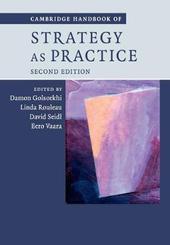
|
Cambridge Handbook of Strategy as Practice
Paperback / softback
Main Details
| Title |
Cambridge Handbook of Strategy as Practice
|
| Authors and Contributors |
Edited by Damon Golsorkhi
|
|
Edited by Linda Rouleau
|
|
Edited by David Seidl
|
|
Edited by Eero Vaara
|
| Physical Properties |
| Format:Paperback / softback | | Pages:692 | | Dimensions(mm): Height 245,Width 170 |
|
| Category/Genre | Business strategy |
|---|
| ISBN/Barcode |
9781107421493
|
| Classifications | Dewey:658.4012 |
|---|
| Audience | | Professional & Vocational | |
|---|
| Edition |
2nd Revised edition
|
| Illustrations |
25 Tables, black and white; 14 Line drawings, black and white
|
|
Publishing Details |
| Publisher |
Cambridge University Press
|
| Imprint |
Cambridge University Press
|
| Publication Date |
30 June 2016 |
| Publication Country |
United Kingdom
|
Description
Now in its second edition, this extended and thoroughly updated handbook introduces researchers and students to the growing range of theoretical and methodological perspectives being developed in the vibrant field of strategy as practice. With new authors and additional chapters, it shows how the strategy as practice approach in strategic management moves away from disembodied and asocial studies of firm assets, technologies and practices to explore and explain the contribution that strategizing makes to people working at all levels of an organization. It breaks down many of the traditional paradigmatic barriers in strategy to investigate who the strategists are, what they do, how they do it, and what the consequences or outcomes of their actions are. This essential work summarizes recent developments in the field while presenting a clear agenda for future research.
Author Biography
Damon Golsorkhi is Associate Professor of Strategic Management at Grenoble Ecole de Management, France. Linda Rouleau is Professor in the Department of Management at HEC Montreal. David Seidl is Professor of Organization and Management at the University of Zurich, Switzerland. Eero Vaara is Professor of Management and Organization at Hanken School of Economics in Helsinki, Finland, Permanent Visiting Professor at EMLYON Business School, France and Distinguished Visiting Scholar at Lancaster University.
Reviews'The second edition of the Handbook keeps the foundational contributions that link strategy as practice with major social and organization theories, which makes it a wonderful reference work that I keep going back to for sheer intellectual stimulation. Equally important, this second edition confirms the value of the growing strategy as practice field as an intellectual substratum from which truly novel and unexpected research findings continue to emerge.' Robert A. Burgelman, Edmund W. Littlefield Professor of Management and Executive Director, Stanford Executive Program, Graduate School of Business, Stanford University, California 'A tour-de-force. This second edition of the Cambridge Handbook of Strategy as Practice keeps pace with the rapidly evolving research in this cutting-edge perspective on strategy. Here the emphasis is on strategy as what real strategists actually do as they practice their craft. It is a 'must-read' for serious students of strategy who want a refreshing view that goes well beyond the often stylized lens of micro-economics. Readers are in for a treat with this theoretically rich and practically compelling volume.' Kathleen M. Eisenhardt, Stanford W. Ascherman, MD Professor, Stanford University, California 'Strategy-as-practice provides an exciting alternative to traditional, economic perspectives on strategic management. The basic idea is simple: 'strategy' is something that people actually do, so let's study that. Towards that end, the Cambridge Handbook of Strategy as Practice contains essays from the world's leading scholars on how to conceptualize and study strategic management as a situated, social process. We gain understanding by looking more closely at the phenomena we study. For strategic management, this book shows us how.' Brian Pentland, Eli Broad College of Business, Michigan State University 'The second edition of the Handbook is a major step forward in surveying progress in this rapidly expanding field, addressing its diverse orientations, and anticipating future developments. For anyone seeking inspiration for the study of strategy as it is practiced, or searching for insights into their strategising practices, the Handbook provides an invaluable resource.' Hugh Willmott, Cass Business School, City University London, and Research Professor of Organization Studies, Cardiff Business School, Wales
|